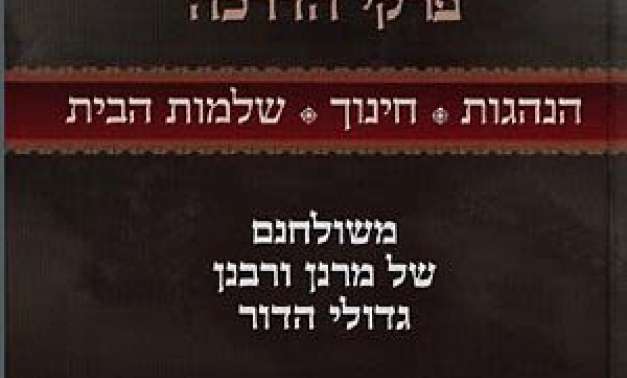
Separation: Putting Out the Fire
A young man dreamed of becoming a firefighter. The day after he graduated high school, he enlisted in the local fire brigade...

A young man dreamed of becoming a firefighter. The day after he graduated high school, he enlisted in the local fire brigade. After passing all the entrance examinations with flying colors, he was given a date and location to report for his training.
During the first week of training, the instructor didn’t mention a word about fire fighting, fire engines, ladders, hoses, and the like. Outside of the two hours a day they devoted to calisthenics and physical conditioning, the new trainees were in the classroom listening to lecture after lecture. They couldn’t believe how much there was to learn about fires – chemically caused fires, environmentally caused fires, electrically caused fires – the list was endless and the subject matter was fascinating.
Once they had completed the theoretical part of their training, the firefighting trainees began to learn the principles of life-saving, first aid, and firefighting. On the third day of their six-week course of practical training, a major six-alarm fire broke out in a densely populated area, threatening literally thousands of lives. All the trainees were ordered to grab their gear and mount the fire trucks. “But Commander,” they protested to their instructor, “we barely know anything yet!”
“Get moving!” barked the commander.
“When a fire’s blazing, every second counts. Once we control it, we’ll get back to basics.”
* * *
Here in our fledgling series about building a successful marriage, we’ve barely covered the basics. Yet, since so many people write us about marital crises that involve separations – a proverbial raging fire indeed, that must be extinguished as soon as possible – we decided to devote the next few articles to a circumstance that many of our readers will never have to deal with, God willing. Nevertheless, don’t ignore these articles, for they contain vital foundations that are critical for overall success in life and for marital success especially. Every couple should learn these foundations. In addition, any person that’s not yet married but is contemplating marriage must learn them as well.
A person’s most crucial tests of emuna are in the home. When a person makes no effort to attain emuna, he’s liable to become entangled in extreme complications, as we’re about to see.
A growing number of women in this generation have ordered their husbands out of the house, and in many cases, having done so with the assistance of law-enforcement authorities and court orders. Such things don’t happen overnight; weeks, months, and years of quarreling and frustration lead to such an extreme measure. Naturally, if the couple had emuna, they’d have never reached this state of conflict; long before, they’d have been praying to Hashem and doing some serious soul-searching in order to correct the core causes of their marital difficulties.
A husband must know that although his ejection from his own home may be totally unjustified, from Hashem’s standpoint – it is complete justice.
Who really kicked the husband out of the house? The court? The police? The social worker? Hashem did, and for a reason. If Hashem made such a decree, it’s certainly just and for the husband’s ultimate benefit, even if the he did nothing wrong. And, if he did do harm to his wife and children, then for their benefit, he shouldn’t remain at home.
An ejected husband must immediately implement the three levels of emuna:
First Level – This is what Hashem wants. He should believe with complete faith that Hashem is the One that has thrown him out of the house. He should set aside all other petty thoughts, complaints, anger, and blame such as this one’s at fault or that one’s at fault, the mother-in-law stirred things up or the wife’s cousin put crazy ideas in her head – nonsense, Hashem did it! He should also forget about revenge, self-pity, exchanging accusations, and feuding. All these negative feelings and urges are the outcome of a lack of emuna.
When a person fails to recognize and accept the principle of Divine Providence, he becomes a candidate for guilt, sadness, and depression. He also lashes out at others with complaints and accusations. If he had emuna, he’d bear no malice toward the police, his in-laws, his wife’s girlfriends, or anyone else that played a role in having him removed from his own household; he’d simply say, “This is what Hashem wants!”
Second Level – Everything is for the best! He should believe with complete faith that Hashem is the One that has thrown him out of the house and for his own good and for the good of his wife and children. Stopping a merry-go-round of domestic strife with devastating long-range effects on the entire family is certainly a beneficial act! As in a faulty machine, once the grinding gears are disengaged, the mechanic can fix the engine. The same holds true in a family; to make peace, the warring parties should be temporarily separated for the purpose of introspection, calming down, and correcting what needs to be corrected.
Separation occurs when a husband and wife fail to mend the flaws in their relationship while sharing the same roof. Also, Hashem resorts to this measure when a man fails to heed the Divine messages that were clothed in the wife’s complaints, or fails to awaken from his spiritual slumber by not correcting the root cause of the tension and strife that has filled their lives.
Hashem ejects a man from his own home as a final measure to save a family from divorce. Ejecting the husband is usually preferable to ejecting the wife, especially when she’s the mother of children, for separating between a mother and children is a harsh measure. The forced separation gives both sides an opportunity for introspection and soul-searching in a calmer environment.
Third Level – What does Hashem want from me? Now that the husband is alone in a quieter setting, free of the constant stress and tension of rubbing elbows with a hostile wife, he should take stock of himself and of his mistakes. This is a time for prayer and for teshuva, for introspection and for correction. It’s the time to appeal for Hashem’s guidance and mercy in order to achieve a thorough solution to the problem. The wife should contribute her part as well with prayer and teshuva on her own right.
When a person does proper teshuva, He who ejected him from the house – Hashem – is also He who shall take him home.
From this section, every person should learn the importance of dealing with problems, no matter how small they may seem to be. The slightest blemish in “shalom bayit” should immediately trigger a root treatment. The old adage of “a stitch in time saves nine” is just as true in mending a relationship as it is in mending socks. When a couple activates emuna, they save themselves the grief of further marital conflict.
To be continued…
Disqualifier: This series is designed as food for thought and to provide practical guidelines for emotionally healthy people who are either married or contemplating marriage. It is not a substitute for the professional help required in situations of extreme emotional impairments and/or disturbances.








Tell us what you think!
Thank you for your comment!
It will be published after approval by the Editor.